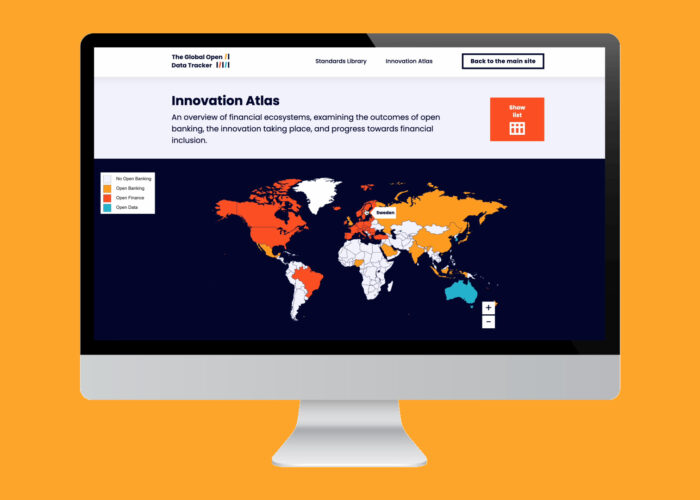Standards by Design: Mapping the global financial landscape in Open Banking


Written by Huw Davies, Chris Michael (Ozone API), Magdalena Getler and Lucy Lloyd (Smart Data Foundry)
The expansion of open banking across the globe has led to a burst of innovation within financial products, leading to improved customer money management where consumers give access, and consent to their data being used. The opportunities to transform the economy and society are even greater with more countries embracing open finance and putting in place a secure data-sharing infrastructure across multiple industries and not just banking.
With open banking initiatives gaining momentum around the world, we are seeing a range of different standards emerge. Smart Data Foundry and Ozone API together bring you the Standards Library and Innovation Atlas, outlining the features and similarities between different standards being set across the globe. Beyond a general desire to drive innovative outcomes, not all standards are designed with the same intentions in mind. As nations look to allow API access to customer-consented data, it’s clear that the main drivers may differ, from competition and inclusion to stability or innovation.
For the UK, with its ground-breaking Open Banking Standard, increasing competition was key. The Competition and Markets Authority’s (CMA) 2016 report found that big banks dominated the market and wanted consumers to benefit from introducing other players. Has the mandating of open banking worked to achieve this in the UK? The FCA reported in 2022 that large banks’ historic advantages were starting to weaken, in part due to digital innovation.
As well as increasing competition, open banking’s other advantages are consumer based- such as increasing the ease of charitable spending and financial decision-making.
Countries with financial inclusion in mind in their open banking regimes such as Brazil, Mexico or Indonesia, look to embrace a broader scope of data exchange and invite new participants into the regime to ensure a greater diversity of products and services for the financially vulnerable.
The Banco Central do Brasil’s goals from the outset aimed for a more ‘inclusive and competitive business environment’, highlighting the promotion of financial citizenship as one of their four objectives. Also listed were encouraging innovation, promotion competition and increasing the efficiency of the National Financial System and the Brazilian Payment System. To tackle these objectives, from the outset a broad range of products were included in their standards.
For India, their open banking move was part of a bigger infrastructure build called India Stack, encapsulating a digital identity infrastructure, a digital documents systems, a payments system (UPI) and the account aggregator framework. This was part of a massive digital overhaul of the management of the economy, with paperwork dominant, to address financial inclusion. Cross-border interoperability, particularly for remittance payments, is another target being addressed by the nation.
In Mexico, financial access is a top priority for the government, whose Fintech Law was enacted in 2018. However regulated open banking is not yet a reality, but with a FinTech ecosystem growing rapidly, and it being a hotbed of software engineering talent, Mexico will be one to watch when open banking does come into force.
Finally in the Kingdom of Saudi Arabia we have seen open banking being driven as a pillar of the ambitious vision for Saudi 2030. Open banking and open finance are seen as a key enabler to transform the financial services sector and as a consequence the economy and society.
As open banking standard frameworks are developed across the globe, it allows for innovative products to spread across borders. Smart Data Foundry looks to drive innovation and produces open banking compliant synthetic data, aizle. Ozone API provides compliant open APIs technology to monetize open banking Globally. With Standards for Innovation, the environment around the globe for applying the APIs and synthetic data can be understood.
Learn more about the global financial landscape by exploring The Global Open Data Tracker.
How can banks monetise open banking APIs? Ozone API CEO & Co-Founder explores 3 commercial models to turn APIs into profit.
Cómo Brasil construyó un ecosistema financiero abierto integral en 5 años con más de 700 participantes y más de 60 millones de usuarios, pasando de seguidor a líder mundial.
Consumer-Driven Banking in Canada received a significant push in the new federal budget released on November 4th 2025. Find out what it all means.